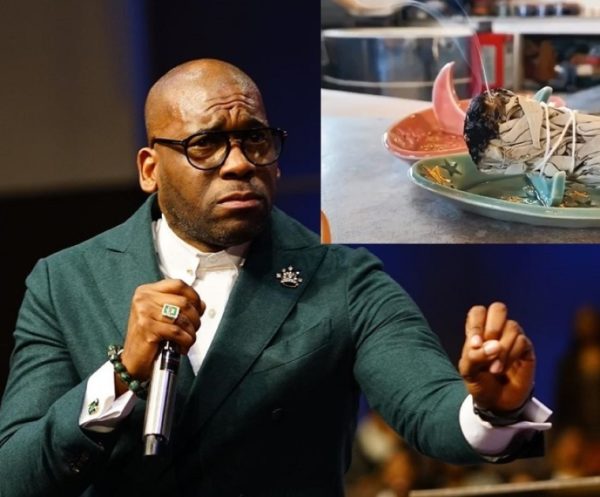
- Details
- By Levi Rickert
STONECREST, Ga. — After receiving sage for a housewarming gift from two women parishioners, Rev. Jamal Bryant, a Georgia Baptist pastor, says he didn’t know what to do with it. So, he did some research and concluded that burning sage is “witchcraft” and “satanic aromatherapy.”
The Christian Post reported “after researching the practice...Bryant has concluded that it is a demonic New Age practice that Christians shouldn’t be involved with.”
Bryant also referenced the burning of sage by Native Americans for smudging.
“Another word for burning sage is smudging. The thought of the Native Americans is that certain herbs carry spirits in them … and when you burn certain herbs you’re calling on those spirits to dispel evil or vexing spirits or energies from a space, from an object or person. And so it is their contention that when I am burning sage, I am then calling down a spirit or calling up a spirit to then wrestle with that energy that’s in a room, that’s in a car or in a person,” Bryant said to the Christian Post.
On Friday afternoon, Native News Online talked to Andrea Riley Mukavetz (Chippewa of Thames), assistant professor of liberal arts at Grand Valley State University (GVSU) and Martin Reinhardt (Anishinaabe Ojibway), professor at Northern Michigan University’s Center for Native American Studies. The two Michigan professors, who were attending the Michigan Indian Education Council’s 2020 Critical Issues Conference at GVSU, commented on Bryant’s remarks about smudging among Native Americans.
Both professors disagreed with Bryant.
“Smudging is a traditional ancestral practice that deeply honors the land,” Riley Mukavetz told Native News Online. “Indigenous belief systems are about honoring the land and healing ourselves. We know our medicines are sacred.
“Also, people should not be sharing religious practices that are not their own. I would not discourage people from buying sage. I would never be engaged in religious practices that are not my own and I would encourage others not to either.”
“Smudging is the quite opposite of what this preacher is implying—that it is somehow evil or satanic,” Reinhardt said. “From our perspective, it is countering that idea because our people have been afflicted by the colonization of our spirituality for a long time. So when they make it a dichotomous religious perspective and throw that at us and try to make our traditions evil, it is really in response to this colonization of the mind, so what we are doing is cleansing ourselves from that. It is really the opposite of what this preacher is talking about.”
READ the entire Christian Post article.
More Stories Like This
Native News Weekly (August 25, 2024): D.C. BriefsUS Presidents in Their Own Words Concerning American Indians
Native News Weekly (December 14, 2025): D.C. Briefs
Wounded Knee Massacre Site Protection Bill Passes Congress
Two Murdered on Colville Indian Reservation
Help us defend tribal sovereignty.
At Native News Online, our mission is rooted in telling the stories that strengthen sovereignty and uplift Indigenous voices — not just at year’s end, but every single day.
Because of your generosity last year, we were able to keep our reporters on the ground in tribal communities, at national gatherings and in the halls of Congress — covering the issues that matter most to Indian Country: sovereignty, culture, education, health and economic opportunity.
That support sustained us through a tough year in 2025. Now, as we look to the year ahead, we need your help right now to ensure warrior journalism remains strong — reporting that defends tribal sovereignty, amplifies Native truth, and holds power accountable.
 The stakes couldn't be higher. Your support keeps Native voices heard, Native stories told and Native sovereignty defended.
The stakes couldn't be higher. Your support keeps Native voices heard, Native stories told and Native sovereignty defended.
Stand with Warrior Journalism today.
Levi Rickert (Potawatomi), Editor & Publisher

